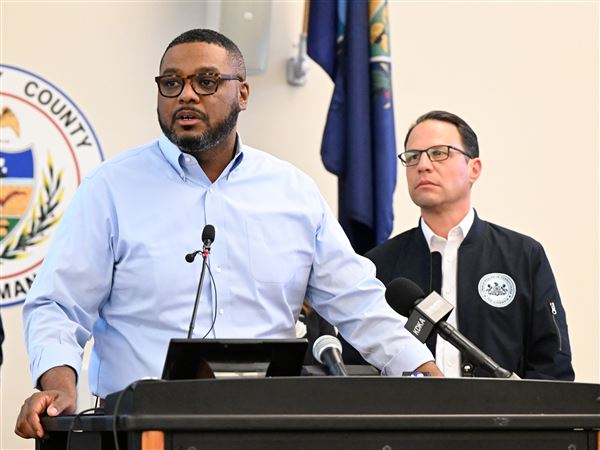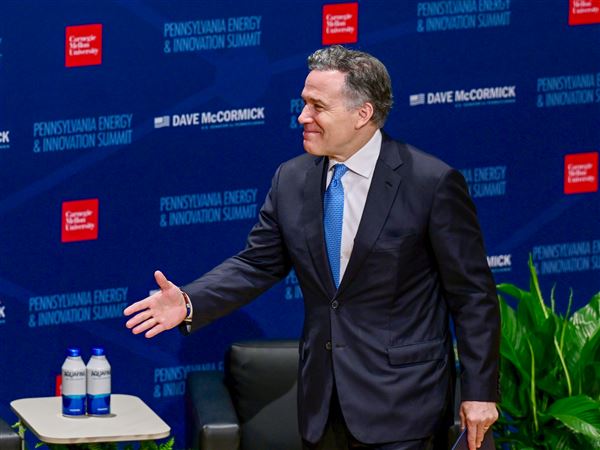WASHINGTON - The Obama administration’s “cancer moonshot” took a major step forward Wednesday when a committee of top cancer researchers and patient advocates recommended an ambitious set of scientific goals designed to sharply accelerate progress against the disease.
The 10 ideas, which were developed by a blue-ribbon panel, dealt with an array of topics, including research, clinical trials, data mining, prevention and patient engagement.
Vice President Biden, whose son Beau died of brain cancer more than a year ago, is leading the administration’s moonshot campaign, and has spent much of the year trying to determine ways to accomplish his mission - to make a decade’s worth of progress against the disease in five years.
One of the most significant initiatives calls for the creation of a network to offer comprehensive profiling of patients’ cancerous tumors. Such tests, which include genetic analysis and are currently taking place at major academic cancer centers, give oncologists important information about how to treat the cancer.
Another recommendation would create a clinical trial network dedicated to immunotherapy, which uses the immune system to fight cancer and is revolutionizing the treatment of some types of cancer. Yet another calls for the increased testing for hereditary cancer syndromes for certain patients and their families. These syndromes can increase the risk for breast, colon and other cancers.
Ellen Sigal, a member of the panel who is also the founder and chair of the nonprofit Friends of Cancer Research, said she was proud of the report. “Often these scientific reports don’t come to the patient level, and this one does,” she said. “I think this is a very patient-centric report, and that’s important to me.”
The panel’s report was accepted Wednesday by the National Cancer Advisory Board and the Douglas Lowy, the acting director of the National Cancer Institute. It was forwarded to Biden’s moonshot task force, which is made up of the heads of various federal agencies and departments.
The recommendations come at an uncertain time. Many of the ideas would require millions - if not hundreds of millions - of dollars in additional funding, but Congress has not yet approved any extra spending for the moonshot effort. And within the cancer community itself, federal officials are still struggling to overcome skepticism that the moonshot will result in breakthroughs against a disease that is expected to kill some 600,000 Americans this year.
Nevertheless, the release of the report signaled the start of a new phase in the anti-cancer campaign as administration officials rush to make as much progress as possible in their remaining months in office.
The 28-member panel said that its 10 recommendations represent the “most compelling” opportunities available to accelerate progress against cancer. The committee set up several working groups that had some 150 experts working on various topics, such as pediatric cancer, enhanced data sharing and clinical trials.
The group, in recommending a national network to offer comprehensive tumor profiling, said it would allow patients to contribute to researchers’ understanding of the disease while allowing them to “preregister” for studies that might be suitable based on their tumors’ characteristics. It added that if patients were willing to provide serial biopsies at “clinical inflection points,” such as when tumors become resistant to treatment, it would give researchers a better understanding of how cancer behaves.
George Demetri, co-director of the Ludwig Center at Harvard and a member of the working group that proposed the tumor profiling, said such a network could be “transformational” in cancer treatment. He said the approach could result in patients in community oncology practices getting the kind of cutting-edge treatment that is provided at big cancer centers.
The report also said that a clinical trials network for immunotherapy could help increase the cure rates, as well as lead to new vaccines to prevent a range of cancers. Immunotherapy is showing stunning success in treating even some hard-to-treat cancers, but it only works in a minority of patients. In another recommendation, the panel called for a redoubling of efforts to understand why cancer treatments often stop working over time, an effort that could lead to a reduction in recurrent cancer.
In addition, the panel proposed a range of strategies to detect cancer in its earliest stages or to prevent it altogether. It called for finding new ways to further reduce tobacco use and increase vaccination against the human papillomavirus, which causes several cancers. It also pressed for greater testing for hereditary cancer, including in people with colon cancer. A condition called Lynch syndrome, which genetically predisposes people to colon cancer, causes an estimated 7,000 cases a year. But, the report said, few patients are tested for the mutation, and so their family members are not alerted to the potential vulnerabilities.
Other panel recommendations included increased research into rogue proteins, called “fusion proteins,” that drive many cancers in children; the creation of 3-D “tumor atlases” to document how various malignancies develop and change over time, and the development of new technologies to study and treat cancer, including implantable devices that deliver micro-doses to tumors to see which work best.
The co-chairs of the blue-ribbon panel were Tyler Jacks, director of the Koch Institute for Integrative Cancer Research at the Massachusetts Institute of Technology; Elizabeth Jaffee, deputy director for translational research at the Sidney Kimmel Comprehensive Cancer Center at Johns Hopkins University School of Medicine, and Dinah Singer, NCI’s acting deputy director.
The report said that the panel had forwarded several important policy issues outside its scope to Biden’s moonshot task force. Those issues include coverage and reimbursement of cancer treatment; the fragmentation of the health-care delivery system; incentives to encourage the development of drugs for children and barriers to data sharing.
The full moonshot task force’s report is expected to be issued by the end of October. In addition, Biden will provide President Barack Obama with an executive report outlining his vision for the future of cancer research, prevention and care.
First Published: September 9, 2016, 12:30 a.m.















